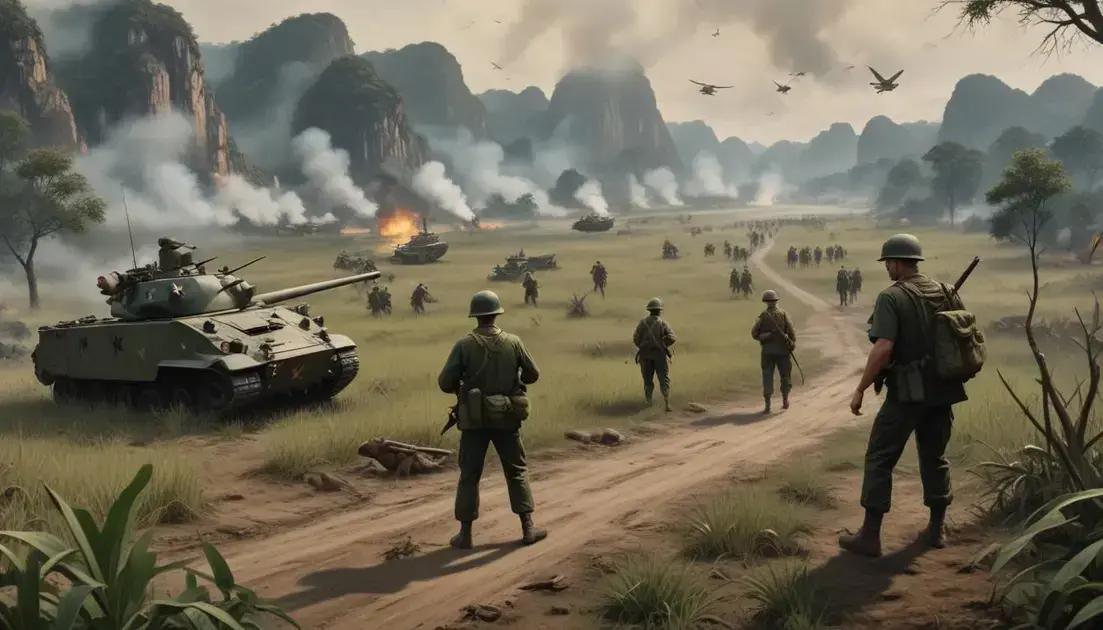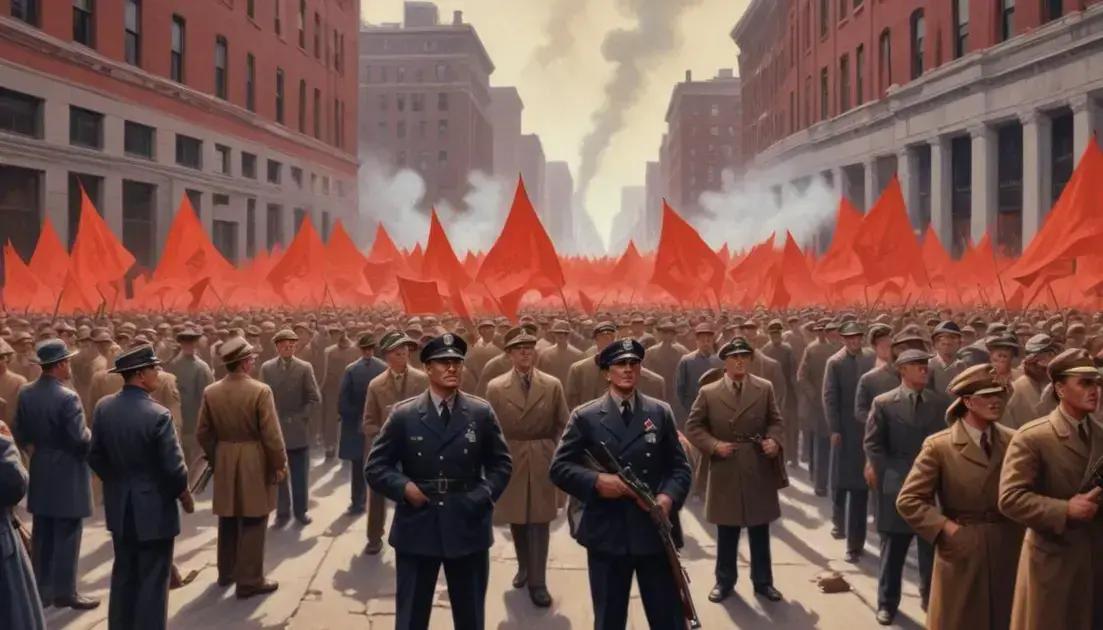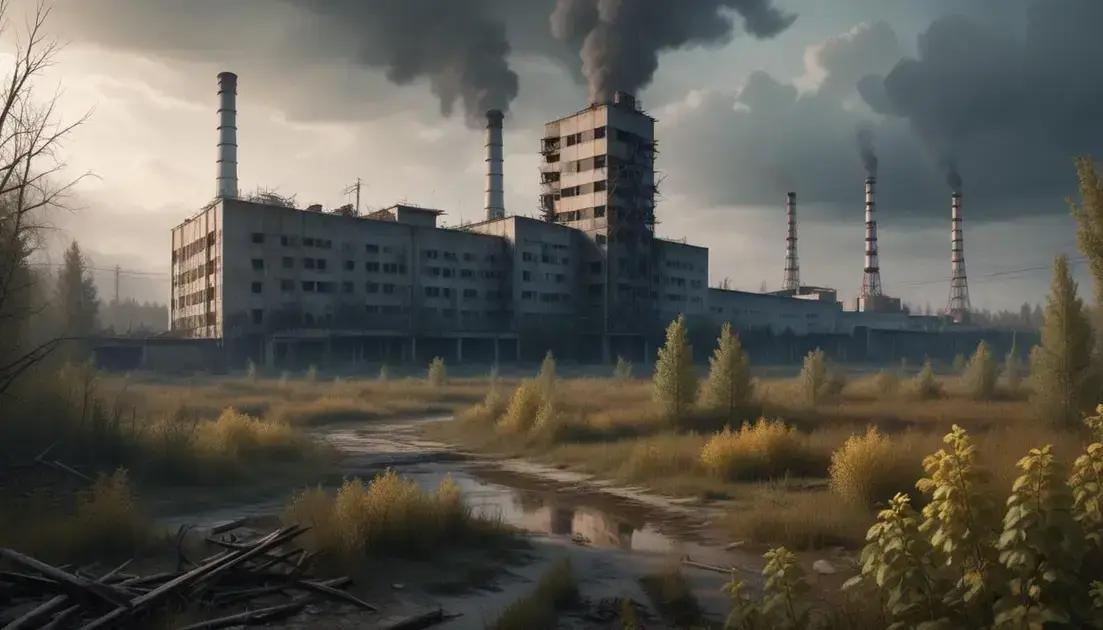
Vietnam: the war that changed America
The Vietnam War had significant impacts on America, affecting public opinion, military policy, and culture. Major events like the Gulf of Tonkin, the Tet Offensive, and widespread protests shaped citizens’ views and led to changes in government. The legacy of the war continues to influence how the U.S. engages in military conflicts today, highlighting the importance of understanding history and its lessons on peace and dialogue.
Vietnam War holds a significant place in American history, sparking debates about freedom, justice, and the true meaning of victory. Are you ready to dive into the complexities of this conflict?
Introduction to the Vietnam War
The Vietnam War was a significant conflict that lasted from the late 1950s until 1975. It involved North Vietnam and South Vietnam, with the United States supporting the South. Many people were affected by this war, including soldiers and civilians. The causes of the Vietnam War were complex, rooted in the struggle against communism and colonialism.
Key Players
North Vietnam was led by the communist government, while the South was backed by the U.S. and other allies. This struggle became a battleground for Cold War tensions. Understanding the key players helps to grasp the conflict better.
Major Events
Several major events marked this war, like the Gulf of Tonkin incident and the Tet Offensive. Each of these events changed how people viewed the war. Many protests occurred in the U.S. as citizens questioned the government’s actions. This conflict deeply divided American society.
Overall Impact
The Vietnam War left lasting scars on both nations and shaped U.S. foreign policy for years. The images and stories from this era are still powerful today. Learning about the Vietnam War helps us understand its significance and how it continues to impact us.
The Causes of the Vietnam Conflict
The Vietnam Conflict had many causes that shaped its history. One major cause was the rise of communism in Asia. After World War II, many countries wanted independence. Vietnam was one of them, but it faced a battle between the North and the South.
Colonial History
Before the conflict, Vietnam was under French control. The Vietnamese people wanted freedom from colonial rule. This desire led to struggles and resistance against the French. After their defeat, Vietnam split into two parts.
Communism vs. Capitalism
North Vietnam became a communist state, while South Vietnam was anti-communist. The U.S. supported the South because they wanted to stop the spread of communism. This support included military aid and advisors, which made the situation more intense.
Influence of the Cold War
The wider Cold War also played a big role in the Vietnam Conflict. The U.S. and Soviet Union were in a race for global influence. This made Vietnam a key area for both superpowers. Their involvement turned a local struggle into an international conflict.
Nationalism and Division
Nationalism was another important cause. The Vietnamese people wanted a unified country. They were tired of foreign intervention and wanted self-determination. This deep-seated desire created a strong divide between North and South.
Each of these factors contributed to the Vietnam Conflict, leading to a war that changed the world.
Key Events and Turning Points
During the Vietnam War, many key events and turning points shaped the outcome of the conflict. One major event was the Gulf of Tonkin incident. It led to increased military involvement from the United States.
The Gulf of Tonkin Incident
In 1964, U.S. Navy ships were allegedly attacked by North Vietnamese forces. This prompted President Johnson to escalate military action. He sought permission from Congress to send more troops.
The Tet Offensive
The Tet Offensive in 1968 was another crucial moment. North Vietnam launched a surprise attack during the lunar New Year. This caught the U.S. and South Vietnam off guard. While it was a military failure for the North, it changed public perception of the war.
My Lai Massacre
The My Lai Massacre in 1968 shocked many people. American soldiers killed hundreds of unarmed Vietnamese civilians. This event fueled anti-war sentiment and increased protests in the United States.
American Withdrawal
As the war dragged on, protests grew. Many Americans questioned the war’s goals. By the early 1970s, U.S. troops began to withdraw. The Paris Peace Accords in 1973 aimed to end the conflict but were not fully successful.
Fall of Saigon
The Fall of Saigon in 1975 marked the end of the war. North Vietnamese forces captured the city, leading to the reunification of Vietnam. This event symbolized the war’s tragic conclusion.
The War’s Impact on America
The Vietnam War had a huge impact on America. It changed how people viewed their government and military. Many Americans protested against the war. They questioned why the U.S. was involved.
Protests and Movements
Mass protests erupted across the country. Students, veterans, and activists joined these movements. People were worried about loss of life and the war’s costs. These protests united many people who wanted peace.
Media Coverage
The media played a key role during the war. Television brought images of the conflict into American homes. Graphic reports changed public opinion. The sight of soldiers and civilians affected many people’s views on the war.
Political Changes
The Vietnam War also led to political changes. Many leaders faced criticism. The government had to change its policies as public opinion shifted. This changed trust in political leaders.
Cultural Effects
The war influenced American culture, too. Music, art, and literature responded to the conflict. Songs about peace and protest became popular. Writers captured the struggles of soldiers and civilians.
Long-term Consequences
Even years after the war, its effects are still felt. Many veterans faced challenges, such as PTSD. The war also changed U.S. foreign policy for years. It taught lessons about military engagement and public support.
The Legacy of the Vietnam War
The legacy of the Vietnam War is still felt today. It shaped how America views military involvement and foreign policy. Many lessons were learned from this conflict.
Impact on Veterans
Vietnam veterans faced many challenges after returning home. Many dealt with physical and emotional scars. The lack of support led to issues like PTSD. Over time, society began to understand these struggles better.
Changes in Military Policy
The war changed how the U.S. approaches military action. The term “Vietnam Syndrome” arose, reflecting wariness of entering new conflicts. Leaders now consider public opinion before engaging in military actions.
Importance of Peace Movements
The anti-war movements from that time inspired future generations. People began to see the power of protest. They learned that citizens can influence government decisions, especially about war.
Cultural Reflections
The Vietnam War left a mark on American culture. Films, music, and literature depict its consequences. Movies like “Apocalypse Now” and songs like “Fortunate Son” capture the war’s spirit and its impact on society.
Enduring Lessons
Ultimately, the Vietnam War teaches us important lessons. It highlights the cost of conflict and the need for dialogue. Understanding this legacy can help guide future decisions on war and peace.
Conclusion
In conclusion, the legacy of the Vietnam War continues to shape America today. The lessons learned from this conflict are vital for understanding the importance of careful military engagement. As we reflect on the challenges faced by veterans and the cultural impacts of the war, we see how crucial it is to promote peace and understanding.
Future generations can learn from the protests and movements that arose during that time. They remind us that citizens have the power to influence government decisions. By honoring the legacy of the Vietnam War, we commit to creating a more thoughtful and compassionate society that values dialogue over conflict.


